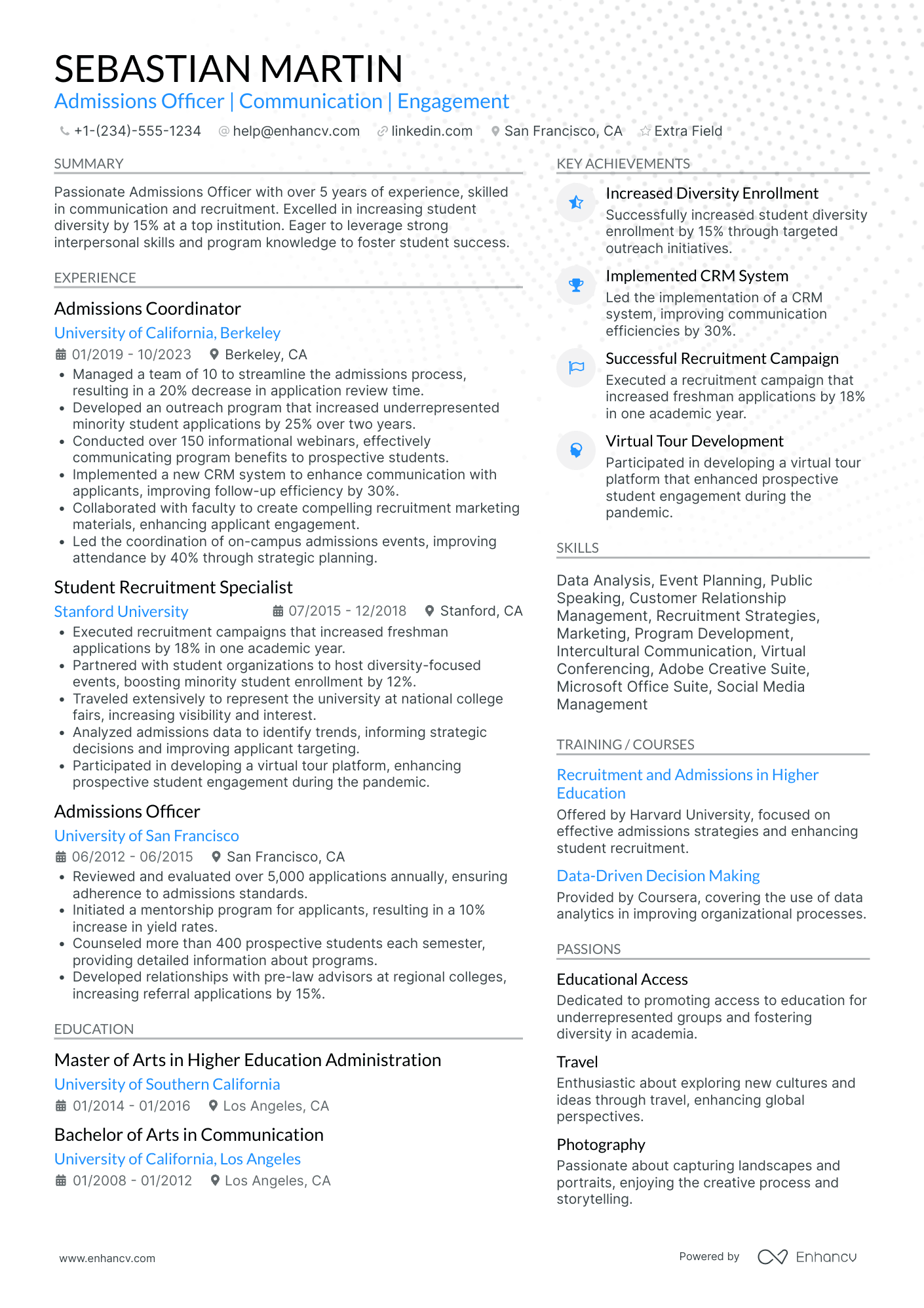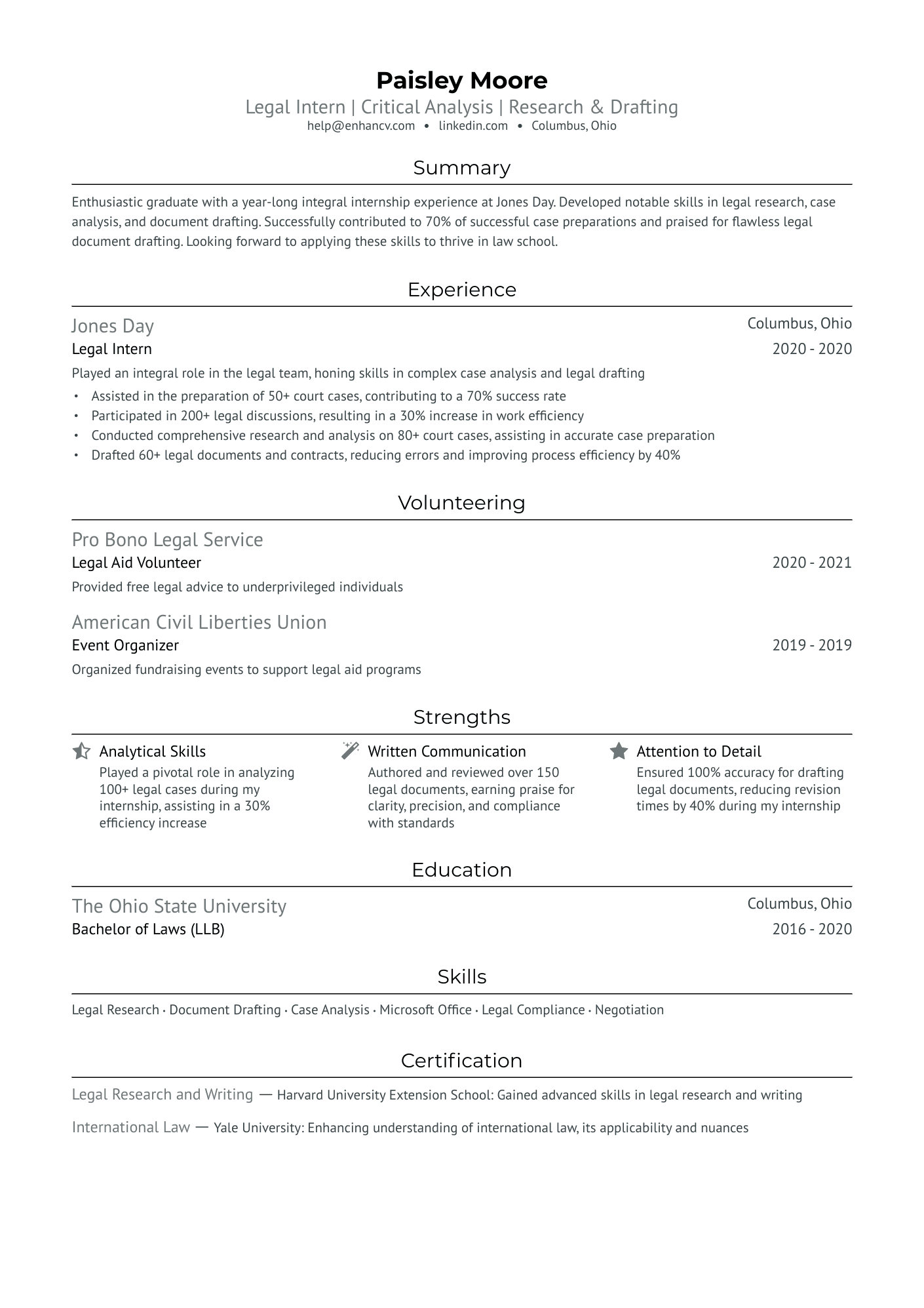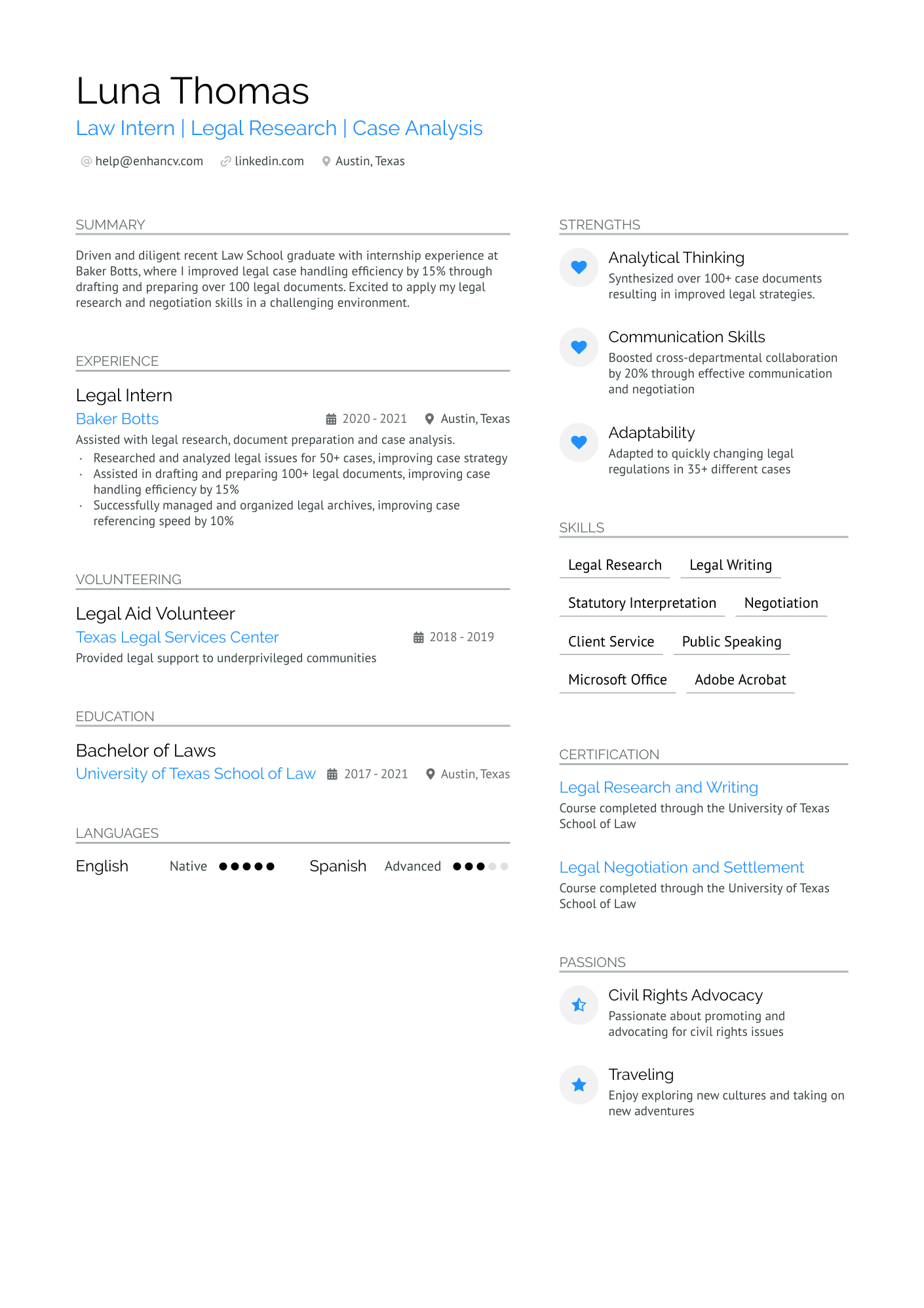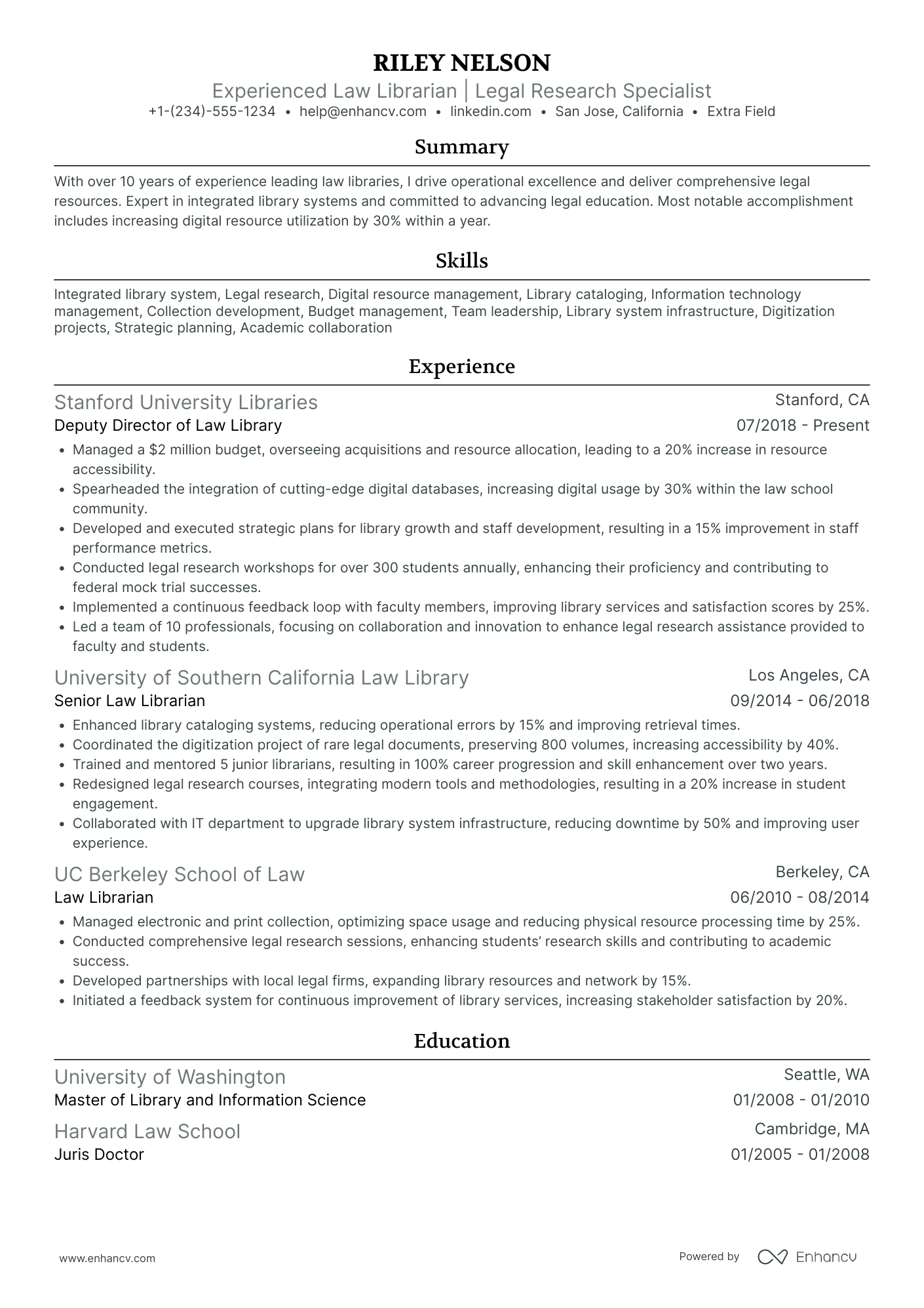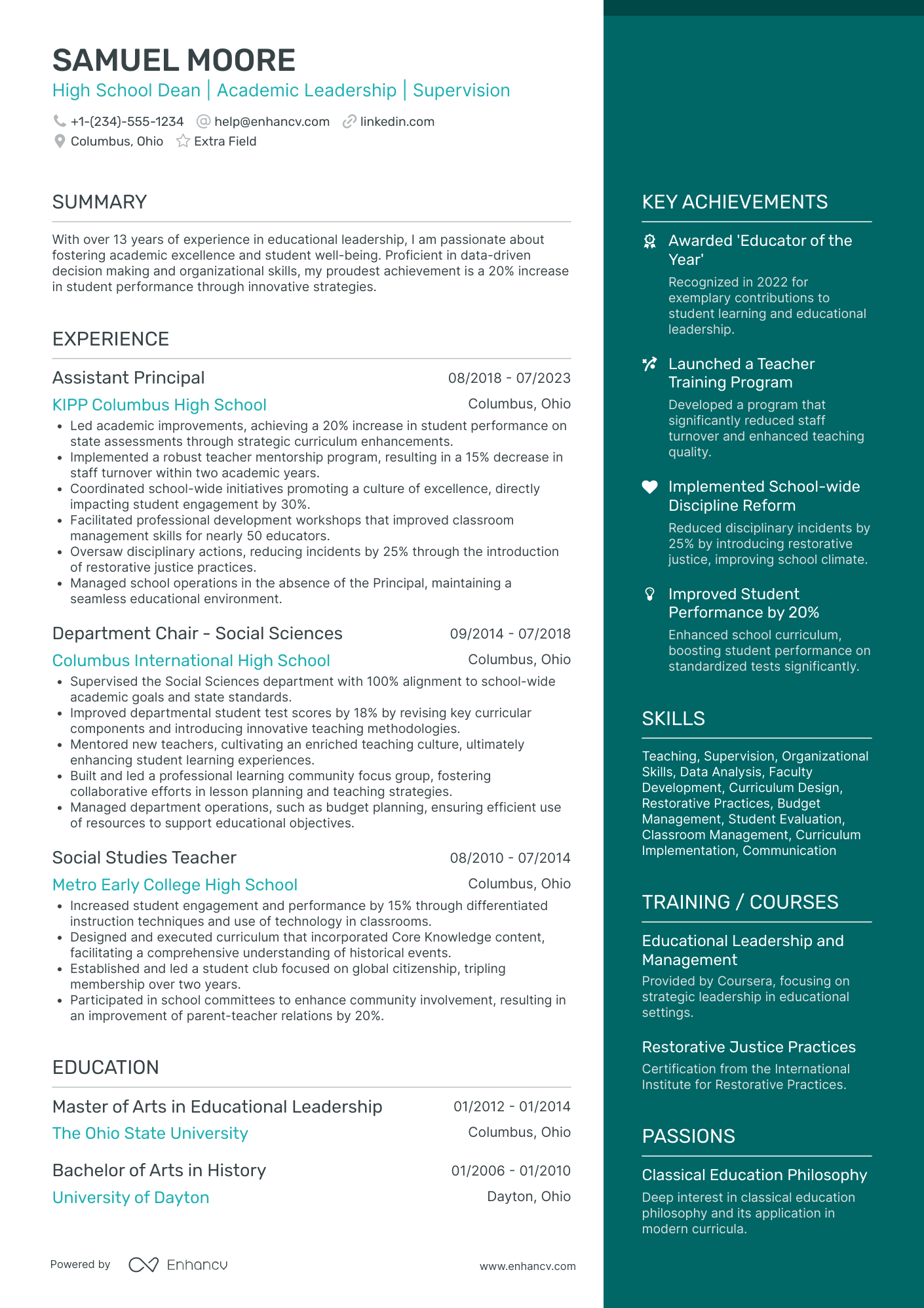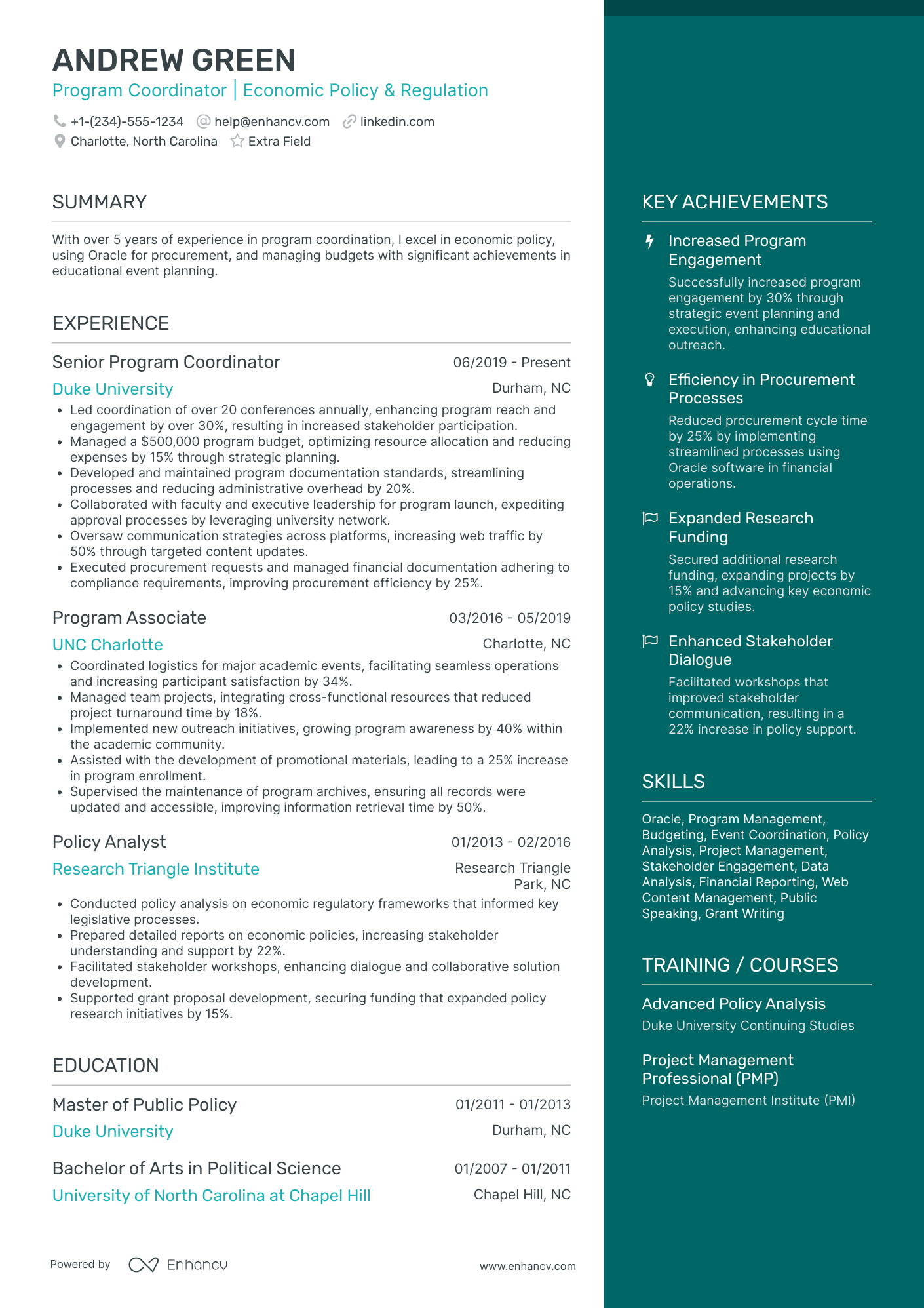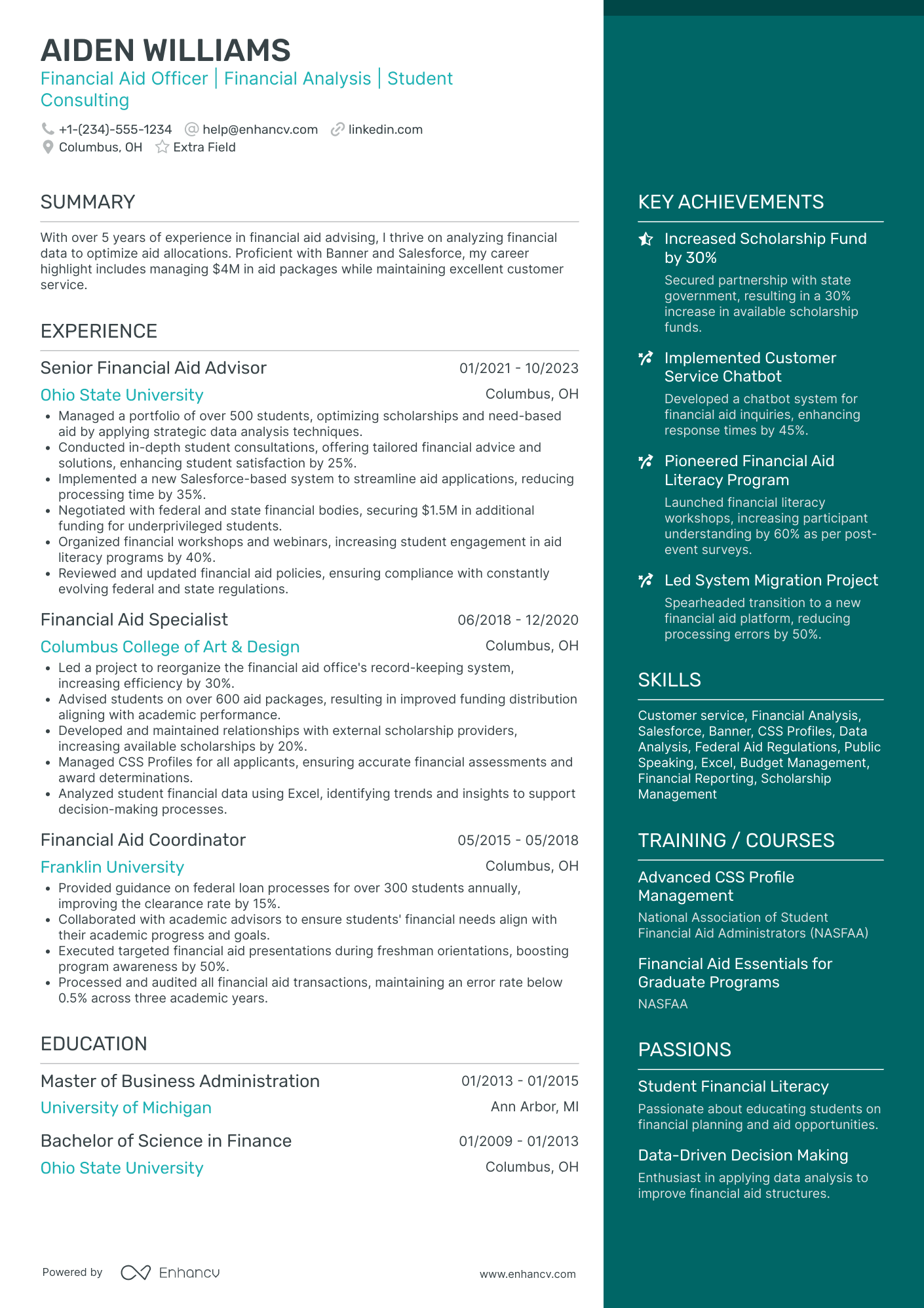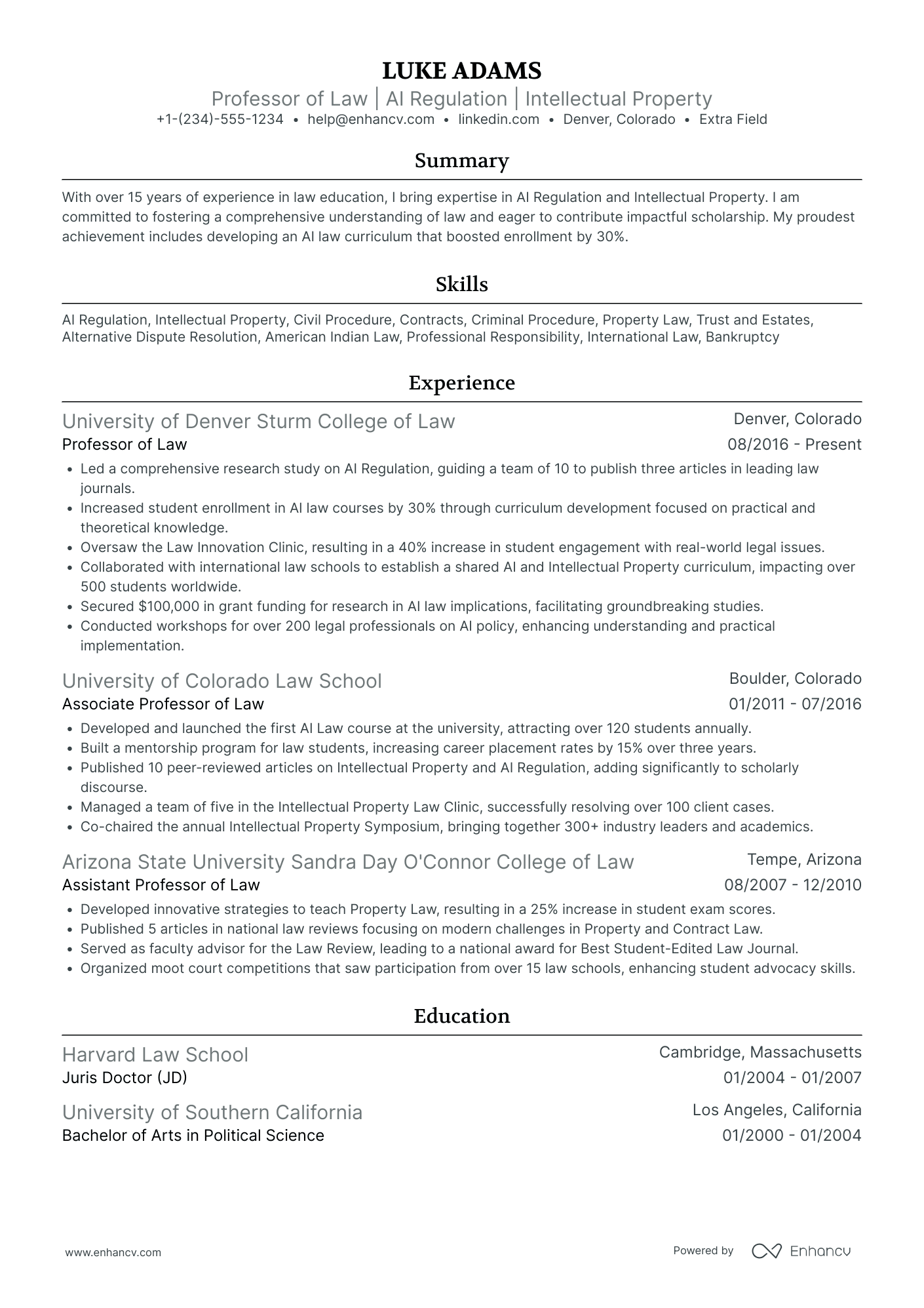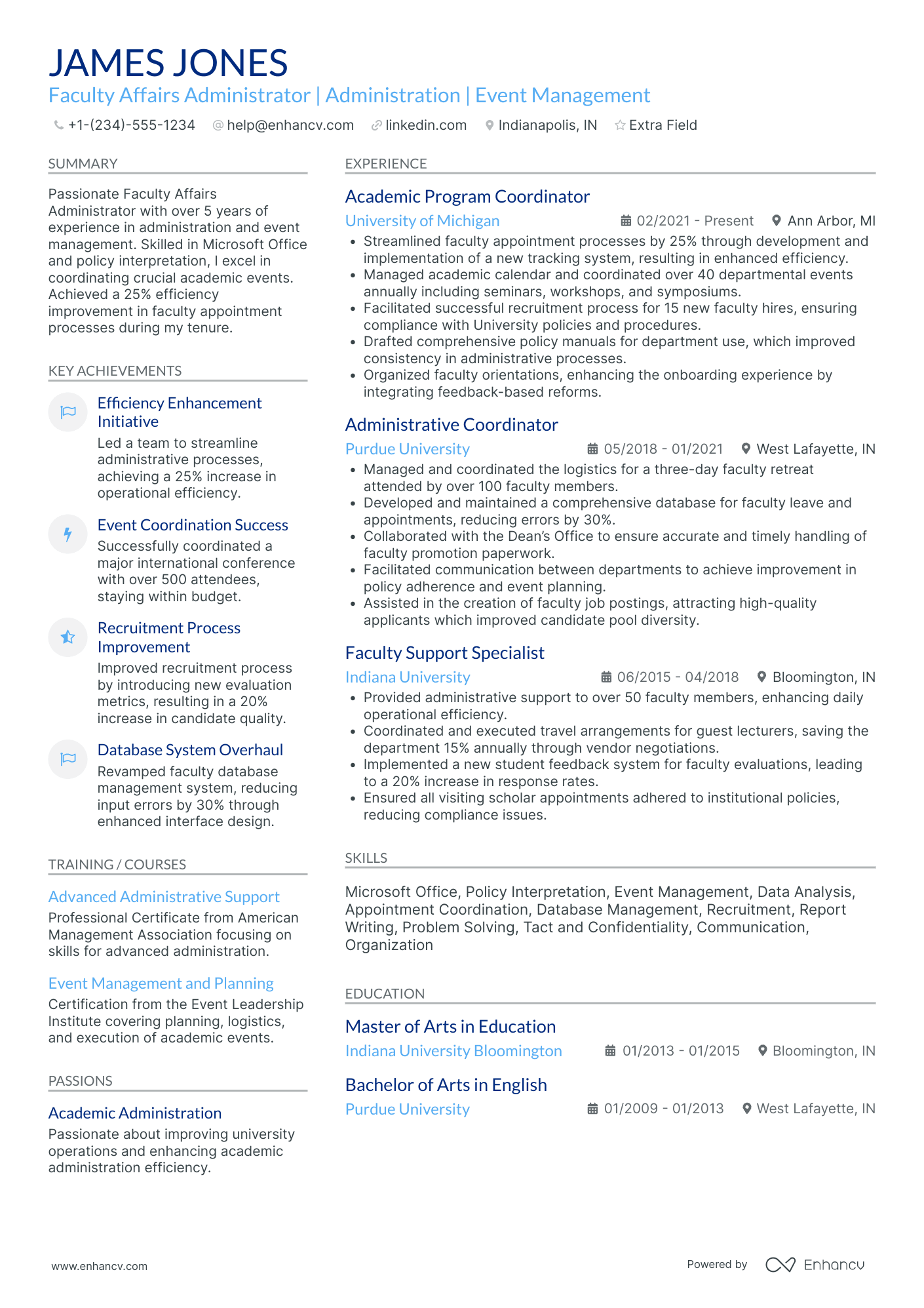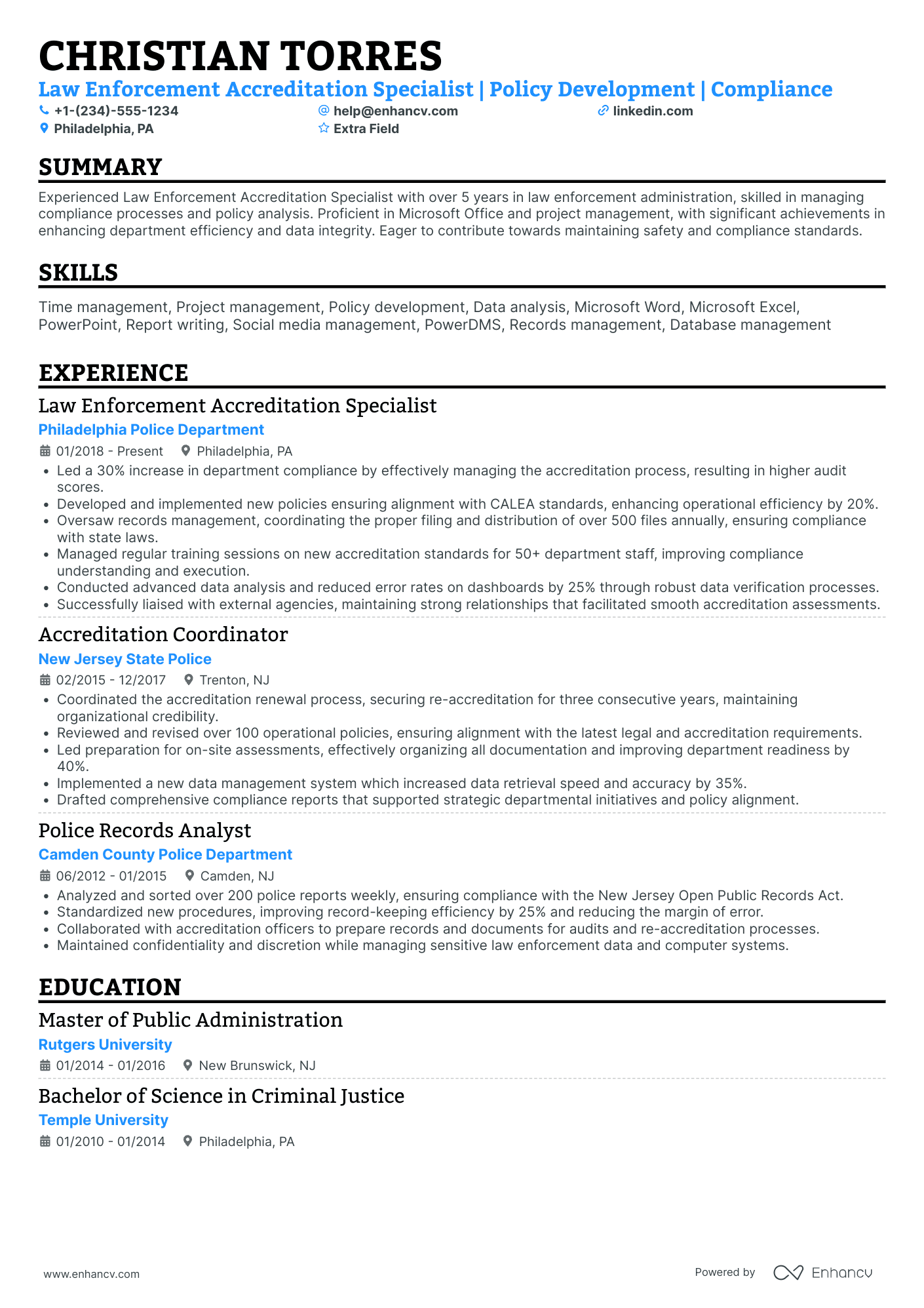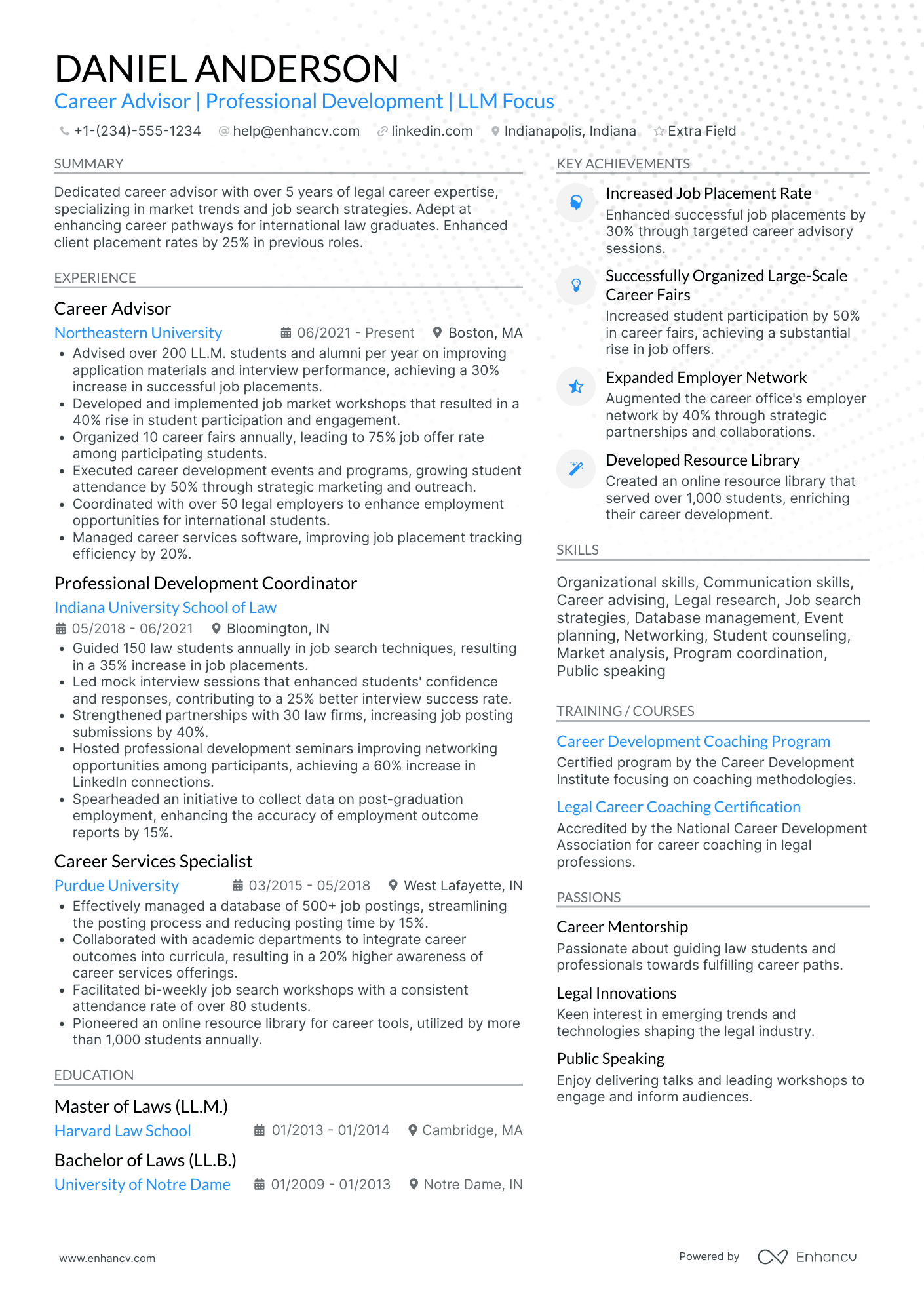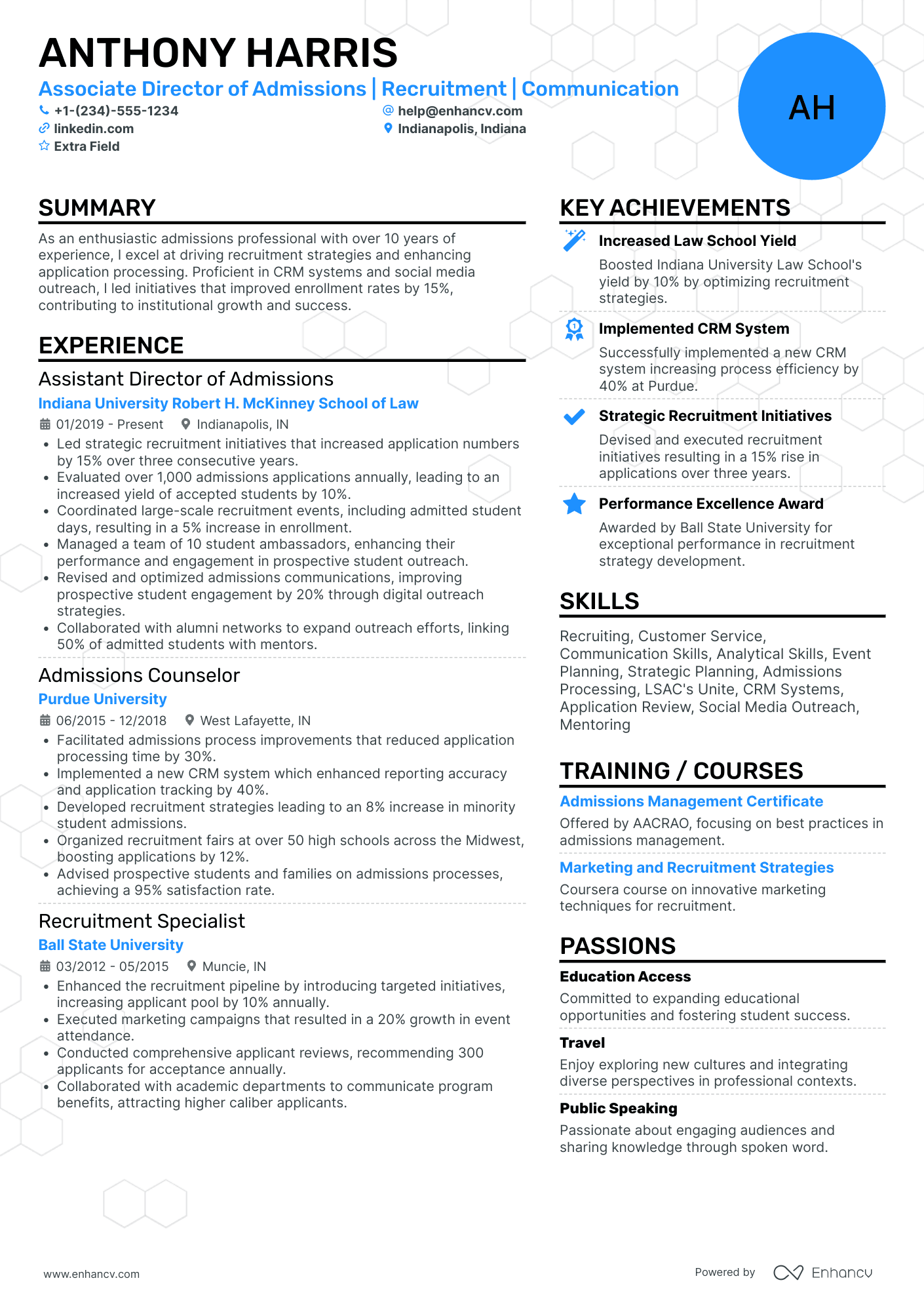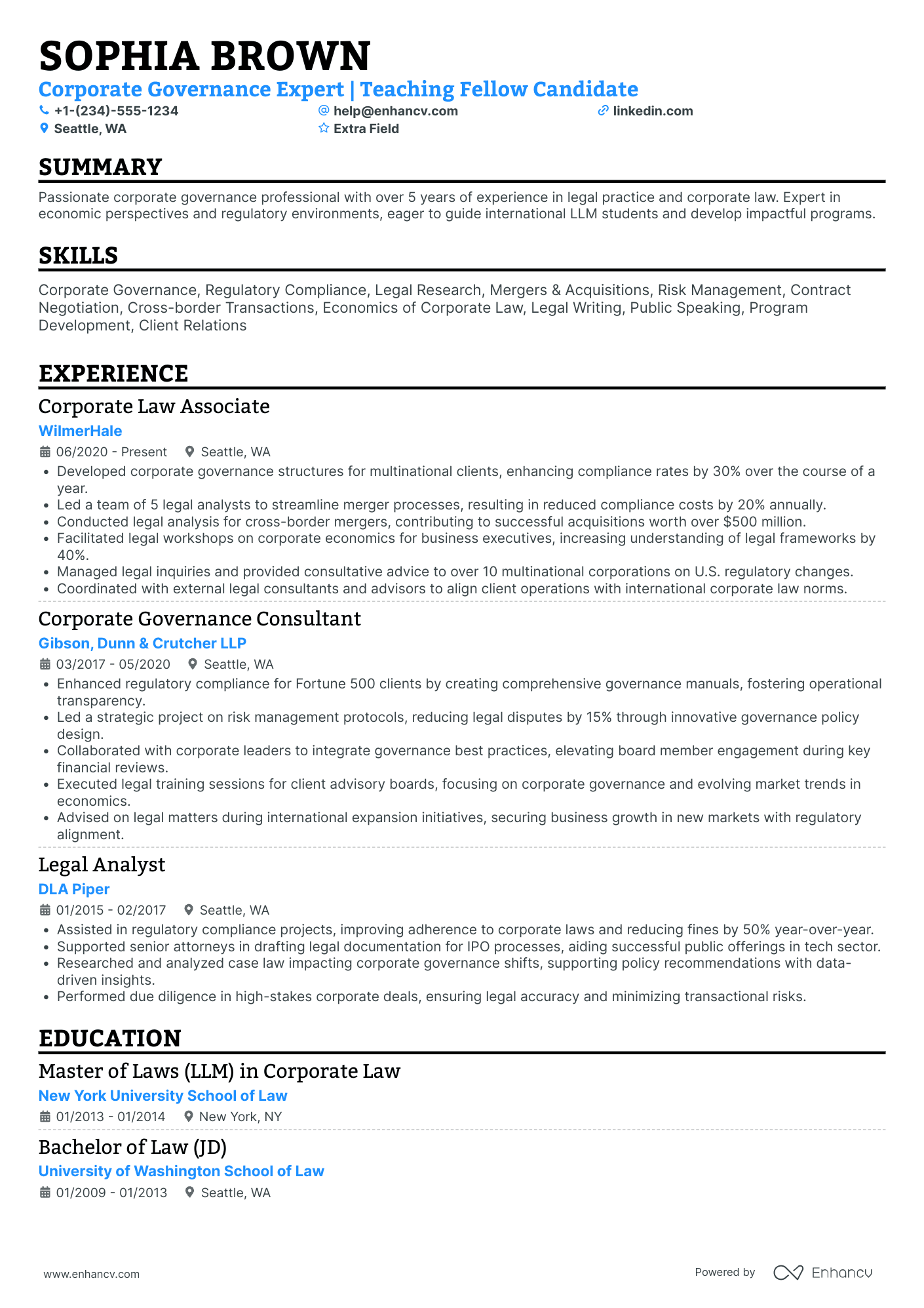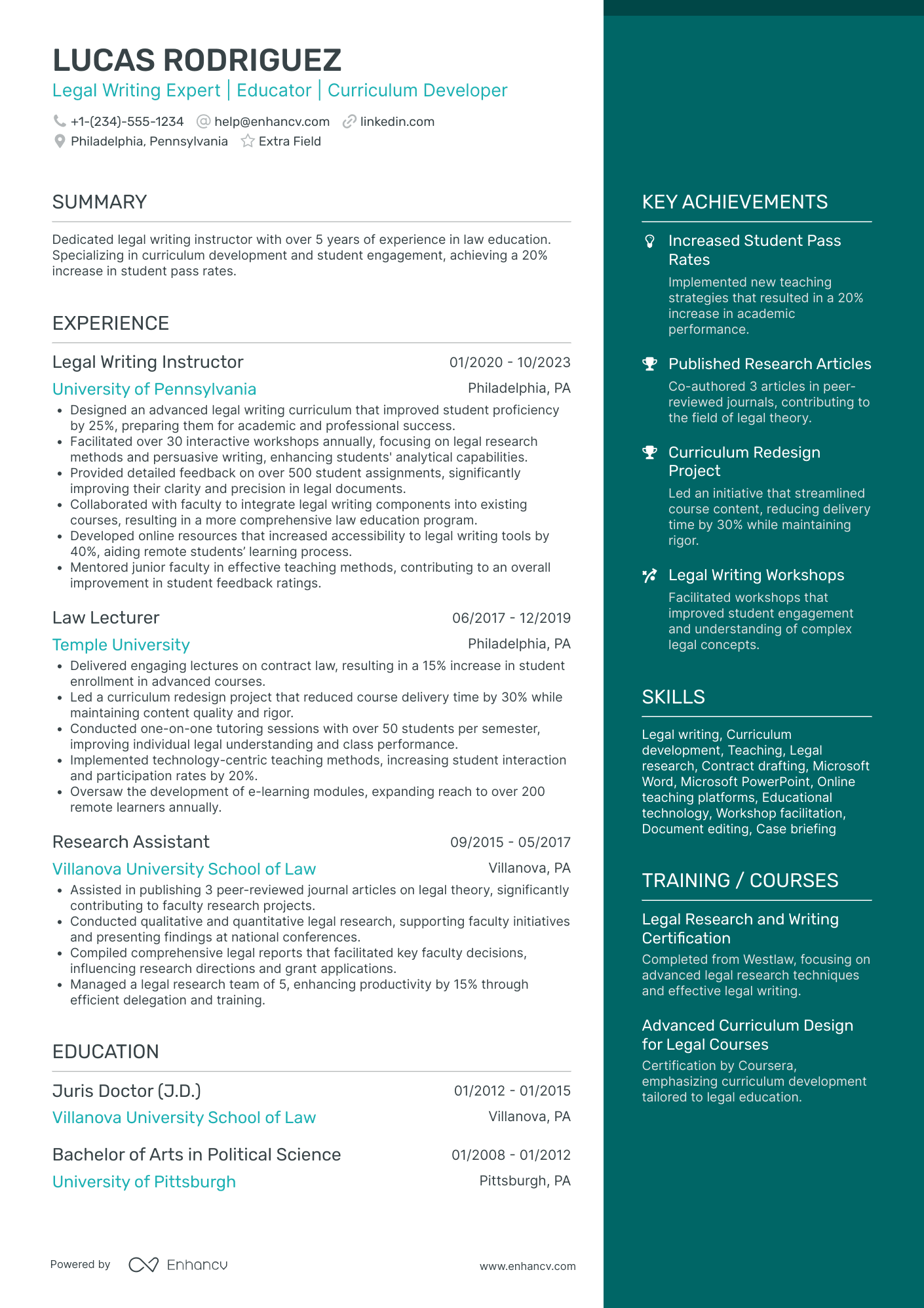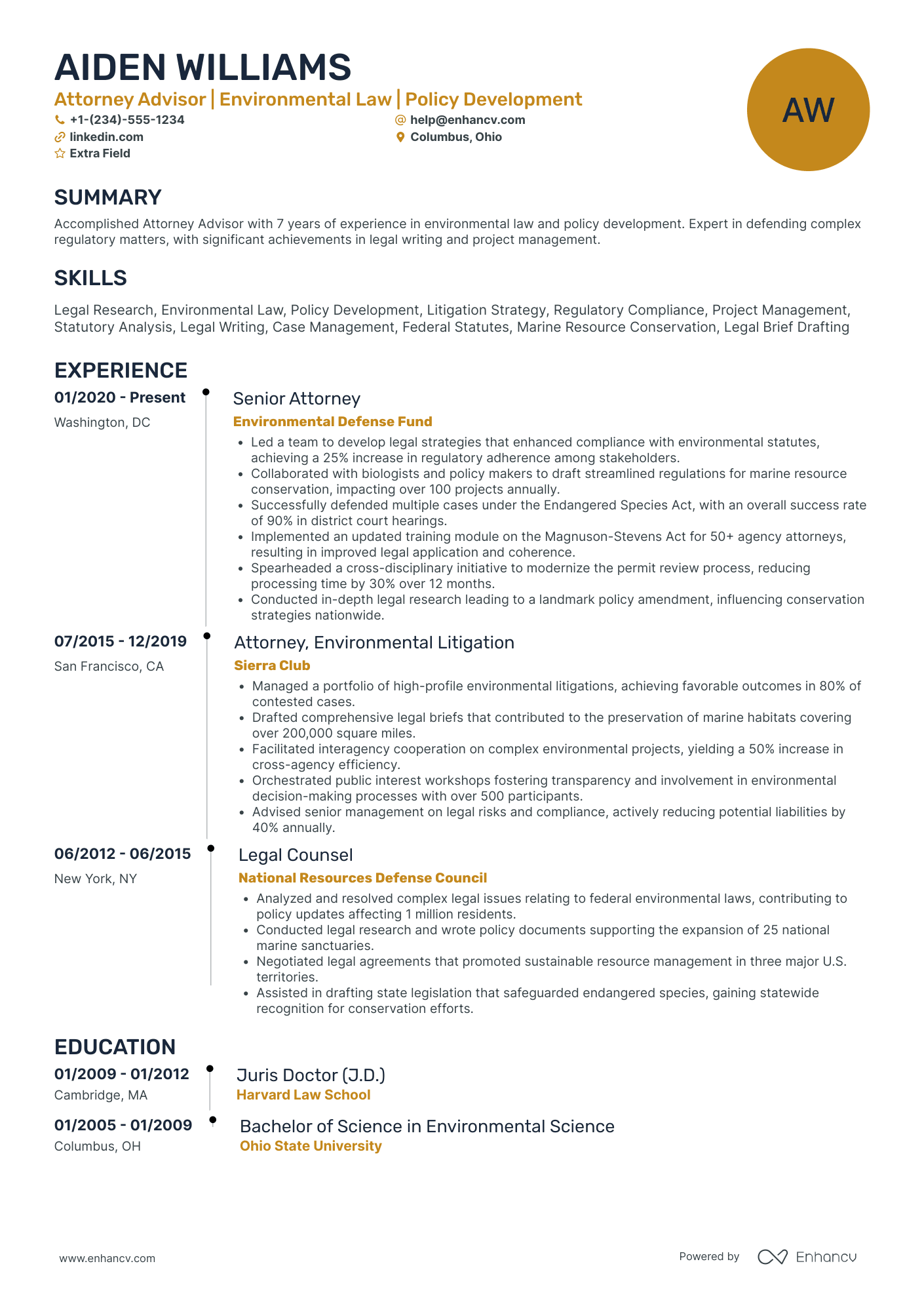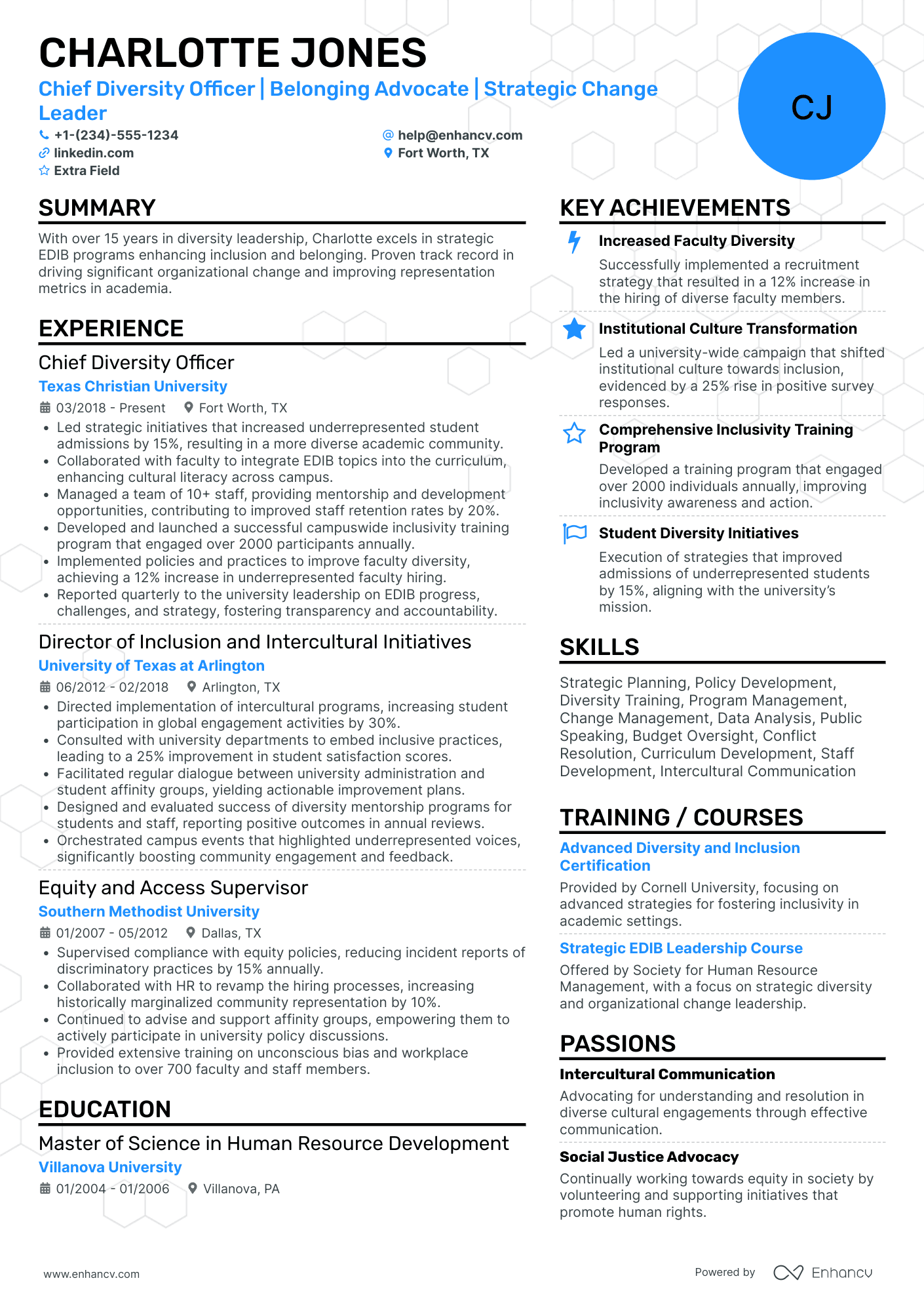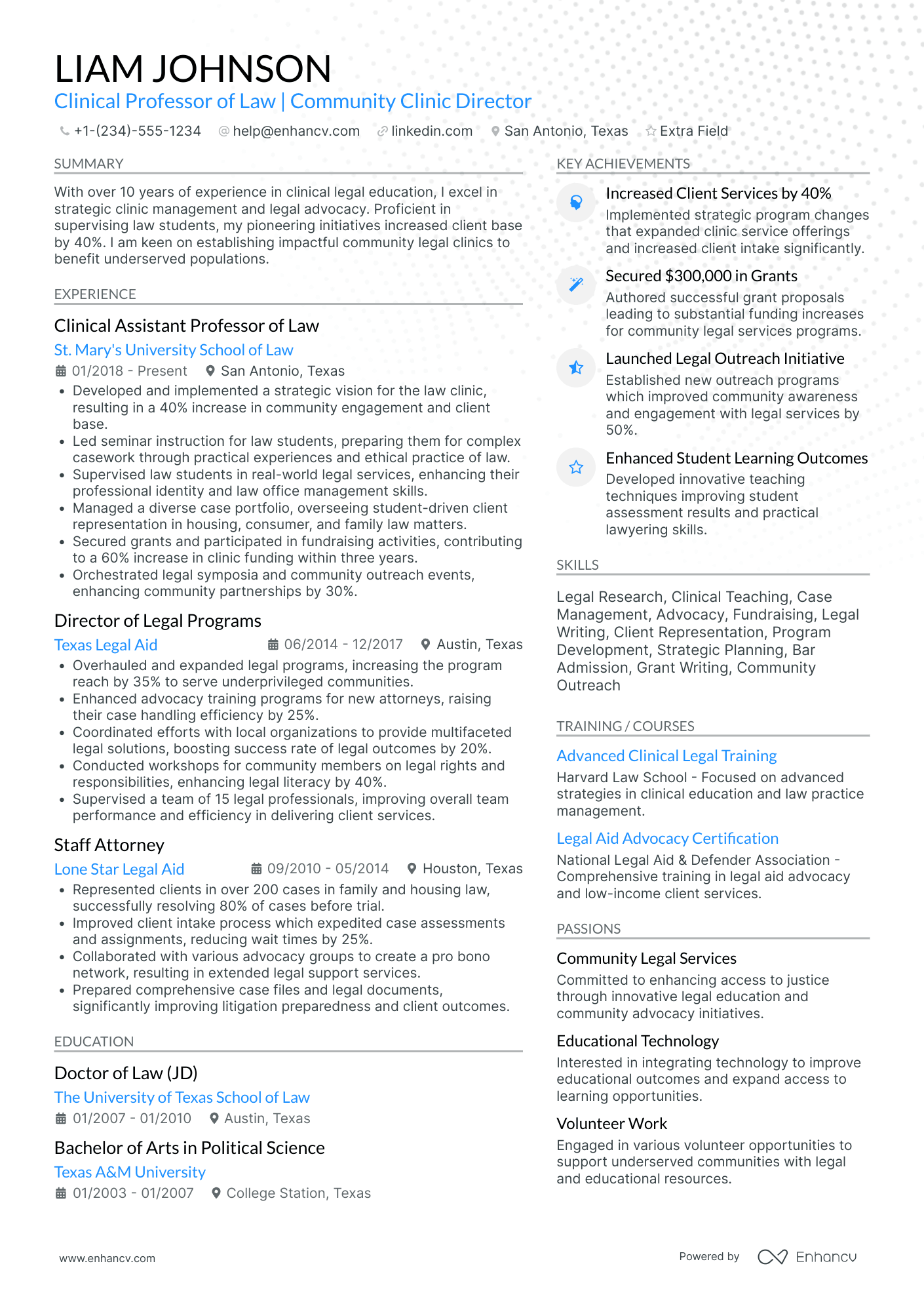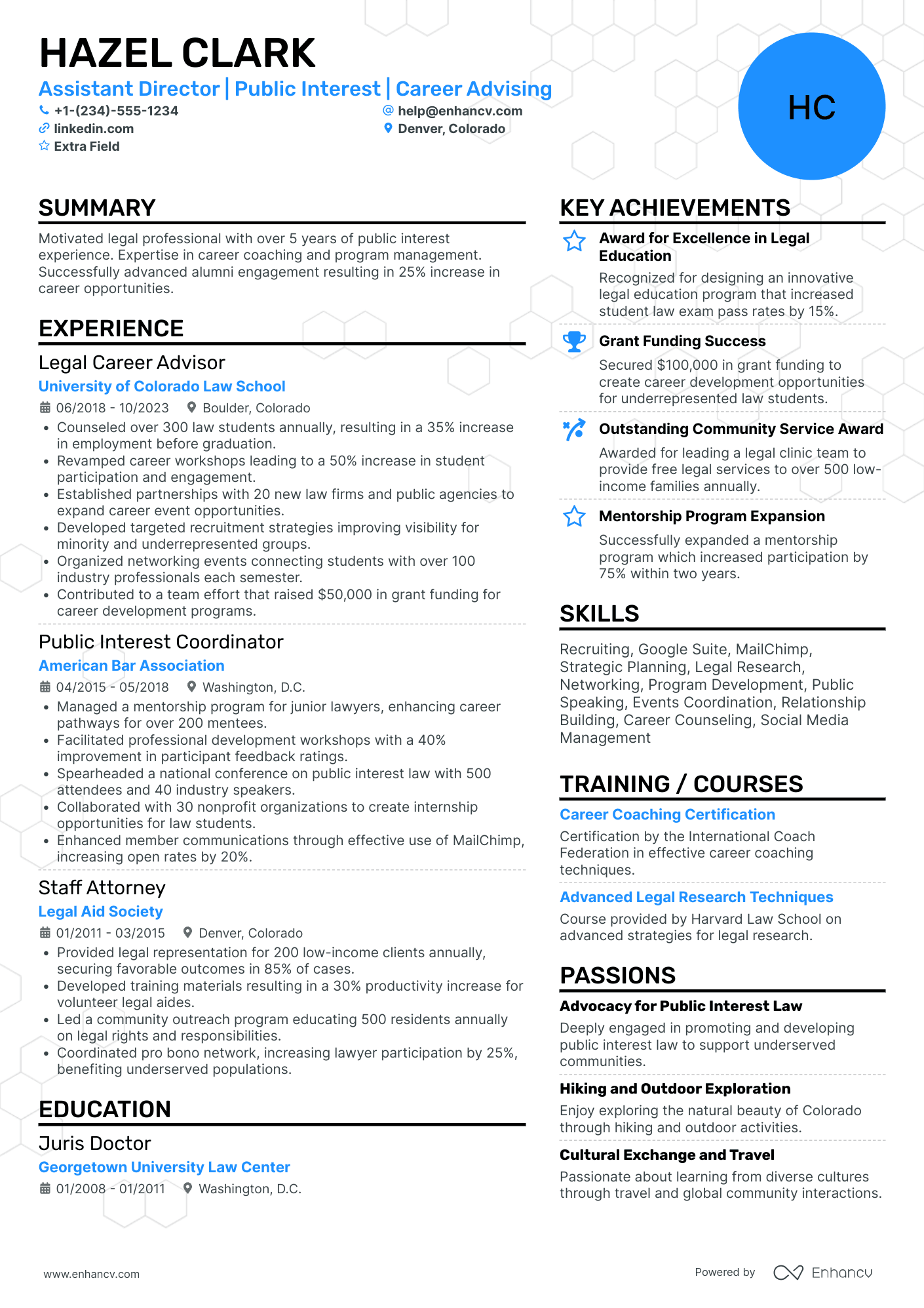Pursuing a law career is both challenging and rewarding, requiring determination and a strong sense of purpose. Law school admissions are notoriously competitive, with an average acceptance rate of just 41% across all schools. At the top 15 law schools in the U.S., this rate plummets to a mere 12.6%.
Admission committees are exceptionally selective and it’s crucial to stand out in every aspect of your application. One key element that can make or break your chances is your resume.
Unlike a typical job-seeker resume, your law school resume should highlight your academic achievements, skills, and unique experiences—such as financial self-reliance, language proficiencies, community service, and leadership—while de-prioritizing some elements like objectives or summaries.
Let us help you show admission committees that you're more than just a number with a perfectly crafted law school resume.
Key takeaways
- Use a traditional, single-column layout and list your most recent and relevant experiences in reverse chronological order.
- Focus on highlighting your academic achievements and personal strengths, rather than including a summary or objective.
- Emphasize a strong skill set that shows your readiness for law school, such as legal research, writing, and critical thinking.
- Quantify your impact where possible to provide concrete evidence of your accomplishments.
- Consider adding additional sections like relevant coursework, publications, or volunteer work to enhance your application.
- Always double-check the specific resume requirements of each law school you’re applying to.
Before we dive into the essential resume sections, let’s look at a law school resume sample you might want to emulate.
Law school resume sample
Each law school may have different requirements or specific formats for their application materials. Some schools may not even require a resume. Be sure to check the particular guidelines for each program you're applying to.
Jack Dubois
Aspiring Law Student & Public Service Advocate
dubois@enhancv.com @LinkedIn Pittsburgh, PA
Education
Bachelor of Arts in Political Science, Minor in Philosophy
University of Pittsburgh, Pittsburgh, PA
Graduation: May 2026
- GPA: 3.85
- Honors: Dean’s List (6 semesters), Phi Beta Kappa Honor Society
- Awards: Political Science Outstanding Senior Award (2026), University Scholar Award (2022)
- Thesis: "The Role of Judicial Review in Contemporary American Politics"
Experience
Legal Intern
Pittsburgh Legal Aid Society, Pittsburgh, PA
June 2026 - August 2026
- Assisted attorneys with legal research and case preparation for low-income clients.
- Drafted legal documents, including briefs and motions, under attorney supervision.
- Organized community outreach programs to educate the public on legal rights.
Research Assistant, Department of Philosophy
Carnegie Mellon University, Pittsburgh, PA
September 2022 – May 2026
- Conducted in-depth research on ethics in law and its application in modern legal cases.
- Co-authored a paper presented at the Eastern Sociological Society Conference.
Community Outreach Fellow
AmeriCorps, Pittsburgh, PA
September 2021 – August 2022
- Coordinated volunteer activities and developed educational programs for underserved communities.
- Led a team of 15 volunteers in organizing local legal clinics and workshops.
Skills
- Legal research and writing
- Public speaking and presentation
- Data analysis and interpretation
- Project management
- Conflict resolution
Languages
- English: Native
- Spanish: Intermediate proficiency
- French: Basic proficiency
The sample provided can be further customized to suit your needs using Enhancv's resume builder, which offers tailored templates and design options to help you set yourself apart. We discuss the essential ones below.
How to format a law school resume
It's important to note that the example provided above differs slightly from the traditional reverse chronological resume format. In a law school application, your academic background is often the most relevant aspect, so it's essential to showcase it upfront. By highlighting your education first, you allow the admissions committee to immediately assess your qualifications and readiness for legal studies.
With that clarified, you should still use reverse chronological order to present your most recent and relevant accomplishments first, then work backward through your experience.
This structure also aligns well with Applicant Tracking Systems (ATS), which some schools may use to scan and prioritize applications.
Different markets have specific resume styles – a Canadian resume, for instance, may require a different approach.
Legal ATS software often verifies details such as educational background and other critical information for authenticity. So, include accurate data and relevant keywords to ensure your resume passes initial screenings.
Here’s the preferred order of the resume sections on your law student resume:
- Header
- Education
- Experience
- Skills
- Optional: relevant additional sections such as Languages, Interests, Volunteering
Design tips
- Use standard margins (0.5-1") to keep the resume clean and readable and opt for a traditional, single-column layout.
- Stick to classic fonts such as Times New Roman or Volkhov (10-12 pt) and a black-and-white color palette for a professional and polished appearance.
- Aim for a one-page resume to show efficiency, as other application documents, such as your personal statement and references, will provide additional context.
Contact information
- In the header, include the details typically required by the law school—usually your name, phone number, and physical and email address.
- Specify your current job title and use a headline reflecting your aspiration to join law school.
- Add a LinkedIn profile link to showcase your professional network and accomplishments.
- Omit a photo to maintain focus on your qualifications and avoid potential biases.
File format
- Name your file clearly (e.g., "JackDuboisLawSchoolApplicant_Resume.pdf").
- Use PDF format unless the law school has a different requirement.
You’ll need to spend a lot of time scrutinizing your law school resume once it's finished. One way to do this more effectively is by using our resume checker, which evaluates your document across 5 categories.
Is your resume good enough?
Drop your resume here or choose a file. PDF & DOCX only. Max 2MB file size.
Let's move on to explore the most prominent section of your law school resume—your educational background.
Law school education section: the key to admission
To set yourself apart in the competitive admissions process, your education section needs to go beyond just listing your bachelor’s degree, which every applicant has. It should be both concise and strong. Here’s what to focus on when building yours:
- List your degree or field of study, the university name and location, and graduation date.
- Include your GPA (if higher than 3.5) to demonstrate academic excellence and build trust.
- Leverage your participation in competitions, forums, or seminars to spotlight the practical skills you've acquired and how you've applied them in real-life situations.
- Underscore any academic achievements, awards, and scholarships to strengthen your application.
PRO TIP
The American Bar Association (ABA) doesn’t recommend a specific major for aspiring lawyers. Instead, they suggest choosing a major that interests and challenges you while developing core skills like problem-solving, communication, and research and writing to succeed in law school.
So, look at a good example of an education section for prospective law students.
- •Dean’s List for 6 semesters
- •Phi Beta Kappa Honor Society member
- •Recipient of the Political Science Outstanding Senior Award
- •Completed a thesis titled 'The Role of Judicial Review in Contemporary American Politics'
Average GPA for law school
The average GPA for law school applicants typically ranges between 3.5 and 3.7. However, much like LSAT scores, the exact average GPA can vary depending on the law school and its competitiveness. Top-ranking law schools often expect GPAs ranging from 3.8 to 3.9 or even higher.
You may wish to enhance your resume by including relevant certificates, especially those related to law, such as legal studies, paralegal work, or mediation. Certificates in public speaking, ethics, or language proficiency can also be beneficial.
Here are some certifications you can consider obtaining before applying to law school.
Best certifications for your law school resume
Now that we've covered education, let's move on to the experience section, where you can showcase your practical professional accomplishments.
How to write your law school resume experience
Prospective law students often engage in internships, part-time jobs, and active participation in extracurricular activities. When writing the experience section of your law school resume, it’s essential to present these in a way that underscores your readiness for law school’s challenges and your potential to contribute meaningfully to the legal community.
Here’s how to do that effectively:
- List your most recent jobs or internships in reverse chronological order.
- Describe your duties with strong, active verbs and keep your language clear and to the point. Avoid jargon unless it’s specific to the legal field.
- Don’t just list your tasks—emphasize what you accomplished in each role. Quantify your achievements where possible.
- If you held a job during school, mention how many hours per week you worked. This shows your ability to balance responsibilities, a skill that’s highly valued in law school.
Creating a targeted experience section
When building your experience section, use specific keywords that highlight skills law schools value—like leadership and analytical thinking—while clearly displaying your most relevant achievements in a way that directly connects with what they're seeking in future students.
Here are some excerpts from the JD program description we’ll use to tailor an experience section.
JD Admissions
Duke law school is a community of lawyers. Some are in the earliest days of their careers; some are in the depths of intense study and research rooted in years of practice, teaching, and public service. When you arrive here, you become a colleague in an intensive and collaborative exploration of the law. We encourage and expect you to create your own adventure, to use the vast resources at your disposal to contribute to Duke Law, to the community, and to the legal profession.
What should I major in?
We look favorably on applicants who have taken a wide-ranging, challenging curriculum and developed skills in writing, close textual analysis, and critical thinking. Rather than select a major because it is "good preparation for law school," you should make your choice because the discipline seems interesting and engaging to you. You will be most engaged in these classes, and do your best work there — which will probably turn out to be the best preparation for law school.
What other activities should I pursue?
As with the choice of major, there is no specific activity, involvement, or employment that we specifically favor. We hope to enroll a class made up of people with a wide range of experiences. As a small, close-knit law school community, we look for students who will be fully engaged in the life of the law school, take on leadership roles in student organizations and journals, and live out the principles of the Duke Law Blueprint.
An impressive work history section should underline key personal skills and align with the values of the organization—this is what we refer to as a targeted resume.
- •Conducted research on policy issues, providing detailed reports that informed legislative decisions.
- •Assisted in drafting and editing legislative proposals, developing skills in precise writing and legal analysis.
- •Liaised with constituents and interest groups, enhancing communication and advocacy skills relevant to the legal profession.
- •Managed a team of volunteers, coordinating grassroots efforts to increase voter turnout, demonstrating leadership and organizational skills.
- •Developed campaign strategies based on data analysis and political research, enhancing critical thinking and strategic planning abilities.
- •Engaged with community leaders and constituents, building a network of relationships and advocacy experience applicable to legal studies.
- •Analyzed legal precedents and case law, building a strong foundation in legal reasoning and critical analysis.
- •Collaborated with faculty on research projects, refining skills in close textual analysis and academic writing.
This experience entry really plays to the applicant’s strengths by highlighting how their political science background has prepared them for law school. Even though they haven’t worked in a traditional legal environment, they’ve gained a diverse set of skills that make them well-prepared for the challenges of law school.
Should you quantify your impact on your law school resume
Another difference between a law school resume and a typical job resume is the lesser focus on numbers and metrics. While quantifying your impact is usually strongly encouraged in job applications, for future law students, the emphasis is more on the skills and values you’ve developed.
However, if you do have concrete evidence of your achievements, it’s still beneficial to include it in your experience entries. They could sound like this:
- Increased student membership in the debate team by 30% through targeted recruitment initiatives.
- Managed a team of 15 volunteers, leading to a 50% increase in voter turnout in the targeted precinct.
- Drafted legal briefs that contributed to a successful outcome in 3 out of 4 cases handled by the firm during the internship.
- Organized 10 community workshops on legal rights, reaching over 200 participants from underserved communities.
Next, let’s explore the best way to list your skills when applying to a law school program.
How to list your skills on a law school resume
When listing your strengths, it’s important to feature both hard and soft skills, demonstrating a well-rounded ability to succeed in the legal field.
Hard skills encompass specialized knowledge relevant to your area of interest, such as business, economics, or foreign languages, and are crucial for roles requiring technical expertise, like international development or litigation. Including these abilities in a dedicated skills section on your resume can enhance your candidacy by showcasing your readiness for a future legal career.
Best hard skills for your law school resume
- Research
- Writing
- Case analysis
- Drafting legal documents
- Contract review
- Statutory interpretation
- Litigation support
- Document review
- E-discovery
- Brief writing
- Citation management (e.g., Bluebooking)
- Westlaw
- LexisNexis
- PACER
- Microsoft Word
- Microsoft Excel
- Citation formatting
- Presentation skills
- Document management
- Database management
Soft skills are equally vital. They illustrate your ability to navigate complex relationships and work effectively in diverse teams—essential for both domestic and international legal practice.
Be sure to emphasize how you’ve developed these skills through coursework, internships, or extracurricular activities, as they are key differentiators in a law school application.
Key soft skills for prospective law students
- Critical thinking
- Analytical reasoning
- Problem-solving
- Communication
- Public speaking
- Negotiation
- Persuasion
- Team collaboration
- Leadership
- Adaptability
- Cultural sensitivity
- Attention to detail
- Time management
- Ethical judgment
- Active listening
- Conflict resolution
- Creative thinking
- Decision-making
With your skills clearly presented, the next step is to decide whether you need a resume profile.
Do you need a summary or objective for a law school resume
Unlike traditional resumes, law school application resumes don’t require a summary or objective section. As the Center for Pre-Law Advising at the University of Wisconsin-Madison notes, “your objective is obviously to get into law school.”
Your personal statement will already provide a detailed explanation of your motivations, achievements, and aspirations. So, instead of creating a profile section, focus on showcasing your key academic accomplishments and personal strengths throughout your resume.
Here's a key expert tip to keep in mind when preparing your law school application:
Too many applicants waste ink in their personal statements and optional essays over-explaining common issues [...]. They become so focused on how they break the mold that they fail to consider that law schools are not looking for prefabricated lawyers.
Rather than justifying the path you’ve taken, or distinguishing yourself from other applicants, show what you bring to the table. Law schools may not be seeking “typical” applicants, but they are looking to build a balanced class composed of students who differ widely but share qualities that will help them succeed.
Gabriel Kuris, founder of Top Law Coach
It's essential to double-check with the institution you're applying to for any specific resume requirements, as different law schools may have unique preferences.
Once you've confirmed their guidelines, you can then focus on incorporating additional sections into your JD admission resume.
Optimize your resume summary and objective for ATS
Drop your resume here or choose a file.
PDF & DOCX only. Max 2MB file size.
Additional sections to consider for a law school resume
Given that law school resumes differ from traditional job resumes, you might consider including additional sections that present your unique qualifications and experiences. Here are some suggestions:
- Academic projects: Showcase significant research papers, thesis work, or major projects that shine a light on your analytical and writing skills.
- Relevant coursework: List any courses particularly relevant to law, such as Ethics or International Relations.
- Publications: If you have authored articles, papers, or blog posts related to law or your area of interest, include them in a dedicated section.
- Professional affiliations: Specify memberships in relevant organizations, such as pre-law societies or debate clubs, that underscore your commitment to the legal field.
- Volunteer work: Emphasize long-term volunteer commitments, especially those that align with public service or legal advocacy, to show your dedication to community involvement.
In conclusion
Crafting a strong law school resume is all about demonstrating your unique experiences and skills in a way that highlights your readiness for the challenges ahead. By following our tips and tailoring your resume to each application, you’ll put yourself in the best position to stand out to admissions committees.
Law School resume examples
By Experience
By Role
